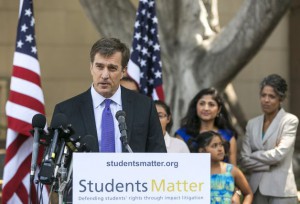Teacher Tenure Laws Fail the Test, but Is a Reward System the Solution?
School’s out for the summer, but the debate over teacher employment is heating up following the California state court’s tentative ruling in Vergara v. California. The Los Angeles County Superior Court declared California’s public school teacher employment laws, the so-called “teacher tenure laws,” unconstitutional for violating the equal protection clause of the California Constitution, which guarantees the fundamental right to equal access to education.
 The lawsuit seeks to overturn several California Education Code statutes:
The lawsuit seeks to overturn several California Education Code statutes:
- Permanent Employment (§ 44929.21(b)): School administrators must either grant or deny permanent employment to a teacher in the teacher’s second year of employment.
- Dismissal (§§ 44934, 44938(b)(1)-(2), and 44944): Before a permanent teacher may be terminated, he or she must be afforded extensive process, which, according to the evidence presented to the court, may take two to 10 years and cost a school district $50,000 to $450,000.
- Last In, First Out (§44955): When layoffs must occur, administrators must start with the last teacher hired, regardless of performance.
According to the court’s tentative ruling: “Plaintiff has proven, by a preponderance of the evidence, that the Challenged Statutes impose a real and appreciable impact on students’ fundamental right to equality of education and that they impose a disproportionate burden on poor and minority students.”
The tenure laws certainly have their share of problems. The probationary period should be expanded to three to five years, the dismissal statutes should afford teachers a reasonable amount of due process, and the Last In, First Out principle should be a factor in determining layoffs, not the only consideration.
But despite the deficiencies of the current laws, the tenure system should not be completely eradicated. The job security afforded by a tenure system is one of the few advantages school districts have over the private sector in their efforts to attract talented teachers. If the tenure system is abolished, the elimination of job security may deter many excellent would-be teachers from choosing the profession over other careers, leading to an overall decline in the quality of public school teachers.
The tenure system’s detractors argue in favor of a reward-based system. According to the website for Students Matter, the organization responsible for funding the Vergara litigation, the solution to the educational divide is to “reward and retain excellent teachers and hold those accountable who are failing our children.”
While incompetent teachers should be held accountable, and rewards may help mitigate teacher burnout, a pure reward-based system is an ineffective way to attract talented teachers. Individuals who tend to thrive in a reward-based culture are more likely to pursue careers that maximize their reward potential, such as sales or business. Because the rewards that are attainable in a public school system can’t compete with the rewards available to high performers in the private sector, a reward-based system will not lure talent from the private sector to the teaching profession.
Furthermore, a reward-based system may contribute to the same inequalities alleged in the Vergara case, namely, a disproportionate number of inadequate teachers in districts with predominantly low income and minority students. Because teachers in a reward-based system will expect to be rewarded with prime teaching posts, the best teachers from these districts may compete to leave for greener pastures, causing a talent vacuum.
The underlying problem with the Vergara case is that plaintiffs misplace the blame. There are a disproportionate number of underperforming teachers in districts made up of primarily low income and minority students not because of tenure laws, but because the working conditions in these schools are inferior to the working conditions at other schools. Many teachers don’t want to teach in these areas.
To increase the quality of teachers in underperforming areas, legislators and administrators must work to improve working conditions for teachers in these areas. Although the employment laws need to be improved, a tenure system is not to blame for the current inequalities, and it creates a valuable incentive to a teaching career.

Comments
Screw education. Screw teachers.
Americans want to be entertained not educated. Who in their right mind would want to spend tens of thousands of dollars and train many years to obtain a license to make scratch as a teacher?
Too much money is to be made in the sex, drugs, sports and entertainment industry. Screw tenure for teachers when you can hire a professor part time at minimum wage.
Yes sir, it’s all about being entertained and paying millions to someone who can run, jump, sing, throw or kick something meaningless to the advancement of society.
The kids in the inner city have a choice; and, being a teacher is not apart of their multiple choice answers.